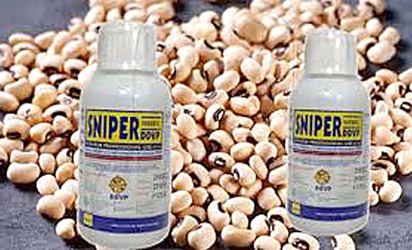Health
‘How beans treated with Sniper kill slowly’
Three siblings allegedly selling ‘poisonous beans’ (beans treated with Sniper) were recently arrested in Lagos. The traders, apparently out of ignorance, claimed that they saw Sniper as something that kills insects and decided to use it to preserve beans and kill the insects. Following this, many Lagosians have stayed away from eating beans. Findings show that the sale of the product has significantly dropped. Also the Consumer Protection Commission, CPC, in a statement, advised consumers to parboil beans before consumption. In this interview, the National President of the Nigerian Institute of Food Science and Technology, NIFST, the body representing food professionals drawn from the academia, industry, government and research institutes in Nigeria, Mr Oluwole Toye, speaks on the scare. According to him, pesticides could be dangerous when ingested with foods at certain levels and they could become harmful, over time, from accumulated consumption. He maintains that only strict adherence to the recommended usage is key.
 Excerpts:
Excerpts:
What are pesticides and their uses?
Pesticides are chemicals deployed in the control and management of insects or other organisms harmful to plants and animals. Pesticides are substances that are used to control pest including weeds. The term pesticide includes all of the following: herbicide, insecticides nematicide, molluscicide, piscicide, avicide, rodenticide, bactericide, insect repellent, animal repellent, antimicrobial, fungicide, disinfectant, and sanitizer. Pesticides could be applied anywhere within the agricultural value chain. These may be in time of planting, through cultivation and harvesting (herbicides, nematicides, pesticides, rodenticides etc.), food storage (insecticides, rodenticide, avicides, bactericides etc.), transportation, distribution etc. They are used in the control and management of insects, plants and other organisms that could lead to loss in stored foods and harvested produce. They are also used to prevent food-borne illnesses and poisoning.
Are they safe for consumption?
They could be dangerous when ingested with foods at certain levels. They could become harmful, over time, from accumulated consumption. In its usage, strict adherence to the recommended usage as contained in the Material Safety Data Sheet, MSDS, is advocated. Most chemicals have a maximum potency time, beyond which it becomes impotent. Therefore, to achieve the kill time/rate for the targeted pest in stored produce, holding time must not be less than the stated time, that is, 90 days. It, therefore, holds that until the expiration of that date, the food, being in contact with the active chemical, cannot be safe for consumption, hence, leading to food poisoning from residual acting chemical contaminated foodstuff. That is the issue here. This could also be an issue from hormonal treatment in poultry products often imported into this country (Orobo). Pesticides help in the reduction of harvested food losses during storage, transportation and distribution. They also ensure safe consumption of food, thereby enhancing nutritional status of consumed foods. It could also impact on the health status of the community, as nutritional foods help in ensuring good health.
Recently, there were issues regarding Sniper treated beans. What is your take on this issue and what is the recommended quantity?
The issue is not the usage, but the residual active time of the chemical, and the informed rate of usage. All pesticides, as with chemicals, are sold with MSDS. This gives details as to the name of the active chemical, the manufacturer, the guidelines on usage, the actions to take in case of accidental exposure and other vital information about the use of the chemical. Sniper is one of the most widely used brands of pesticides in Nigeria because of its effectiveness in controlling pests, especially insects and reptiles. Sniper belongs to the organophosphate family of pesticides containing DDVP (2.2 -dichlorovinyl dimethylphosphate) as active ingredient. It is highly toxic and used mainly as fumigants for outdoor purposes. However, because it is readily available and affordable, Sniper has become the most widely abused pesticide. It is used by both farmers and traders at pre-and post-harvest storage including open markets to control insect infestation in foods especially beans, oil seeds and similar grains. As to its usage, NIFST recommends informed usage by competent operators who have been sufficiently trained and are knowledgeable as to the safe usage of chemicals. Alternatives available, traditionally, include dried whole bell pepper/chilli, dry heat and other efficient warehouse handling methods. However, every method in place must be guided by well-informed guidelines (MSDS) and applied by a competent trained and certified operator.
Food regulators and monitoring
Regulators are doing a good job. However, there is an urgent need for self-regulation to achieve the desire objective – provision of safe food to consumers. This can only be achieved when there is awareness through dissemination of information on the correct usage of chemicals, this time Sniper, and a stricter management and control of the importation, storage, distribution, transportation and application. Traceability of sold produce should be encouraged through firm implementation of certified commodity warehousing schemes by NAFDAC working with the Federal Ministry of Agriculture.
EU and rejection of Nigeria’s agricultural products
There is a need to inaugurate the National Food Safety Committee and Policy. I believe that this initiative, aptly supported by knowledgeable professionals within the food profession, will bring a halt to this. There is also a need for continuous training and certification of food processors and facilities to ensure safe food delivery to our teeming population and to ensure export potential.
Recommendations on how to prepare foods treated with Sniper or any other pesticide
It is absolutely necessary to prevent the consumption of these chemicals through food purchased in the marketplace by ensuring you buy only from trusted stores where this may not be an issue. This can only be achieved through sufficient information dissemination on safe practices in the use of chemicals in food preservation. Perchance if there is a suspicion that food has been contaminated by chemicals, it should be disposed off. However, in some aspects, contaminated food should be rinsed severally in running water to reduce the level in the food. This, however, will not assure complete elimination of the chemicals; hence food poisoning hazard exists.
Consequences of consuming foods preserved with Sniper and other harmful chemicals
Gastro- intestinal health issues, brain and other internal tissue damage, blood poisoning, food poisoning and could also lead to fatality – death.
What is NIFST doing to sensitize the public about food safety?
NIFST organizes seminars, workshops and international conferences bordering on all aspects of safe food production, processing, warehousing, sale and consumption. We are currently on a street food safety awareness drive. This commenced with a pilot in 10 local government areas in Lagos State. The success achieved in this was with the active collaboration of the state government, NAFDAC, the police and other statutory bodies operating within the state. This initiative is now extended to cover the use of chemicals like Sniper, and engaging raw food retailers in the marketplace by NIFST-trained food safety field resource persons.
What is your charge to government?
Government should create an enabling environment for professionalism in the agricultural value chain through the recognition and empowerment of trained food professionals to regulate the practice of the food profession in Nigeria. This involves the certification and expert training of all persons who desire and are willing to produce food for public consumption. This can be achieved by signing into law the establishment of the Council for Food Science & Technology. Government can also support this drive by ensuring that only trained and certified food professionals occupy the post of food scientific officers in all local government areas in Nigeria. This will ensure sufficient knowledge dissemination and management of safe food cultivation, harvesting, storage, distribution, transportation and sales. The CBN/Federal Ministry of Agriculture Wallet programmes, through which fertilizers are delivered to registered farmers, can also be deployed in the awareness training and information dissemination to the agricultural value chain operators on the safe use of chemicals. Government should also urgently establish commodity marketing boards to set up centralised mega- storage warehouses in the six geo-political areas of Nigeria. The boards will bulk-buy all harvested produce, warehouse efficiently and sell to retailers. With this, there will be informed usage of chemicals and traceability of foodstuff will be assured. There should be improvement in the policy regulating the import, storage, warehousing, distribution and sale of chemicals in Nigeria. NAFDAC should be further strengthened through provision of adequate personnel, training and analytical facilities to do this. School curricula should include recognition of safe food, from the primary school level.
Nigerian fathers eager for early sex – Study
A study carried out by a Nigerian ‘Mom and Baby Care Company’, Mothersbond Limited, has shown that most Nigerian men, who recently became fathers, are eager to know how early sex can resume after childbirth.
The study also showed that the new fathers were very concerned about the after effect of childbirth on their partners’ birth canal.
The study, which interviewed 1,088 married and unmarried fathers via telephone calls, emails, and through social media on Instagram and Facebook messenger across 30 states in Nigeria, focused on men aged between 25 and 49.
Among those interviewed in the study, which was concluded in August 2018, 60 percent were first-time fathers.
Speaking on the findings in Lagos, the Chief Executive of Mothersbond Limited, Mr Michael Osuji, said: “The study revealed that these concerns are really strong for men, and only secondary to the safety of their wives and babies. In essence, once the wife/partner and baby are safe, the first thoughts that come to mind are when (how quickly) intercourse can resume; followed by the postpartum condition of the birth canal; how and when the belly and overall body of their partner would go back to shape and the after-effect of breastfeeding during the months of nursing.”
Osuji added,”We find that these concerns are more important to them, and rank higher than the cost implications of having a new baby, long-term postpartum complications if any, as well as changes in the home that come with having a newborn which we thought should be at the very top of their mind but it wasn’t.
“We took it a step further and shared our findings with women about what majority of men had said (not their own partners specifically) and 94 percent weren’t surprised at all. 78 percent of the women had same concerns”.
On his part, the Head of Sales and Marketing of Mothersbond Limited, Winifred Chukwuemeka, explained that the research also engaged with mums who are the primary customers of the brand.
The findings further revealed that 93 percent of mothers who had used a Mothersbond product said they chose the brand for the next baby product they bought after a first purchase, and another 97 percent said they would recommend Mothersbond as a trusted brand to friends and family.
“This is an indication that our customers are satisfied with our post-pregnancy abdominal binder, our super-fast breast pumps and baby bouncer/rocking chair, as well as our other products”, she added.
Follow us on social media:-

 Crime2 days ago
Crime2 days agoBello Turji’s gang kidnaps 10 passengers, burns vehicle in Zamfara
-

 Crime2 days ago
Crime2 days agoMan k!lls his mother and four young sisters in hotel room with the help of his father to ‘save their honour’ (video)
-

 News22 hours ago
News22 hours agoEmotions flow as lady witnesses tragedy at hospital, pregnant woman and baby pass away during labor
-

 News2 days ago
News2 days ago“Adam and Eve ate nothing, were you there?” – Apostle Abel Damina reveals, says smoking and drinking is not a sin (video)



